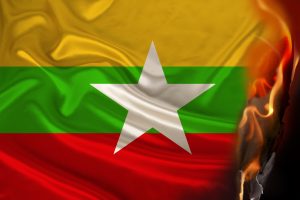Myanmar’s military junta has condemned the United Nations and various Western governments for their criticisms of its chilling plan to execute four political prisoners for campaigning against last year’s coup.
Last week, a spokesperson for the military administration announced that it would execute four detainees, including Phyo Zeyar Thaw, a former lawmaker from the National League for Democracy, and the prominent democracy activist Ko Jimmy. The executions, which would mark the first use of the death penalty in several decades in Myanmar, prompted immediate criticism from foreign governments, including the United States and France, as well as the U.N.
A spokesperson for U.N. Secretary General Antonio Guterres said the global body was “deeply troubled” by the decision and asked the junta to drop the charges against “those arrested on charges related to the exercise of their fundamental freedoms and rights.” U.S. State Department spokesperson Ned Price condemned the plans, saying the executions exemplified “the regime’s disregard for human rights and the rule of law,” adding, “We urge the release of all unjustly detained.”
In a hysterical press release published on the front page of the state-run Global New Light of Myanmar on Monday, the junta’s Ministry of Foreign Affairs condemned these criticisms as “irresponsible and reckless” and said that they could jeopardize diplomatic ties with the aforementioned nations.
It defended the sentences handed down against Phyo Zeyar Thaw and Ko Jimmy, saying that the pair “were proved to be masterminds of orchestrating full-scale terrorist attacks against innocent civilians to instill fear and disrupt peace and stability.”
The military administration took particular umbrage to a French Foreign Ministry statement that condemned the planned executions and described the military-run State Administration Council (SAC) as “le régime militaire illégitime” – an “illegitimate military regime.”
The hard-to-dispute French characterization “not only wantonly meddles in the internal affairs of Myanmar in the pretext of human rights and democracy,” the statement said, “but also flagrantly violates the Vienna Convention on Diplomatic Relations.” The Ministry added that the legitimacy of the SAC was “unquestionable.”
Even amid the steady stream of atrocities and human rights outrages that have issued from Myanmar since the military takeover on February 1, 2021, the junta’s planned executions have elicited an usually strong response. As Han Htoo Khant Paing and Richard Roewer wrote in a searing article in The Diplomat yesterday, the executions represent the junta’s attempt to erase all memory of Myanmar’s pro-democracy struggle, by eliminating its leading tribunes. A total of 114 people have been sentenced to death since the military coup.
While past death sentences have often been commuted, junta spokesperson Zaw Min Tun yesterday rejected the possibility of pardons in the case of the four. “The death penalty will be implemented,” he told Radio Free Asia’s Burmese Service. “They will not be pardoned. We have finished the process all the way up through the appeals.”
While there is some chance that this is all a bluff designed to extract concessions from the outside world, the military now finds itself in uncharted waters, facing not just the resistance of ethnic armed groups in the borderlands, but also an armed insurgency in the country’s ethnic Burman heartland. If these sentences are carried out, then the legal logic of the convictions – Phyo Zeyar Thaw and Ko Jimmy have both been accused of “treason” and supporting terrorism against the military junta – suggests many more executions to come.
The Myanmar military’s vociferous statement offers another sign, if one was needed, that even in the midst of its multisided civil war, it is able to muster a fiery indignation against even the most formulaic criticisms. Unfortunately, such thin-skinned assertions of its legitimacy will have little bearing on how it is perceived by the Myanmar public at large – and its ongoing struggle for survival.































